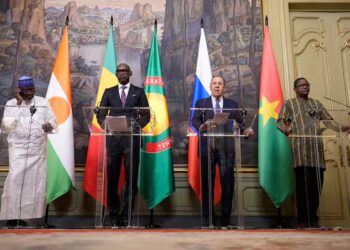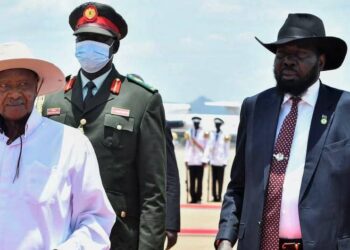By John Ikani
The Sudanese army has announced that diplomats and nationals from the UK, US, France, and China are to be evacuated from the country as fighting continues.
Army chief Fattah al-Burhan has agreed to facilitate and secure their evacuation “in the coming hours.”
The announcement comes amidst a power struggle between al-Burhan and the leader of a rival paramilitary faction, the Rapid Support Forces.
Previous plans to evacuate foreign nationals have not been implemented because of safety concerns.
However, a statement from the army now confirms that British, US, French, and Chinese nationals and diplomats will be evacuated by air on board military transport planes from Khartoum’s international airport.
The UK government has stated that it is preparing for “a number of contingencies,” although it has not specified whether immediate evacuations are among those plans.
UK Prime Minister Rishi Sunak chaired an emergency response committee meeting on Saturday morning regarding the situation in Sudan.
The government also expressed its commitment to supporting British nationals and diplomatic staff in Khartoum.
However, British citizens in the area are feeling “completely abandoned” by their government. One individual reported feeling “in the dark” and without any evacuation plan.
“We don’t have a plan, we don’t even have a kind of plan for a plan. We understand that this is a fast-evolving situation but to be honest, we’ve just in many senses been completely abandoned here,” she said.
Saudi Arabia is also arranging the evacuation of its citizens and nationals of “brotherly” countries.
Spain’s defense minister has stated that six planes are being sent to Djibouti as part of the country’s efforts to evacuate Spanish nationals and others.
Despite both sides agreeing to a three-day ceasefire to mark the Muslim holiday of Eid al-Fitr, starting from Friday, the conflict has entered its second week.
Sporadic gunfire and air strikes were heard in the capital on Saturday despite the truce. Medical teams are being targeted in the fighting, and thousands of people, mostly civilians, have been injured, with medical centers struggling to cope with the influx of patients.
Mariam al-Mahdi, a former foreign minister, who is sheltering in Khartoum, has stated that the ceasefire is “not taking at all.”
She reported that there have been power and water outages, with rotting bodies of young people in the streets.
The World Health Organization has stated that more than 400 people have been killed, although the death toll is believed to be much higher.
The UN has warned that up to 20,000 people, mostly women and children, have fled Sudan to seek safety in Chad, across the border from Darfur.
The western region of Darfur, where the Rapid Support Forces first emerged, has also been badly affected by the fighting.



































